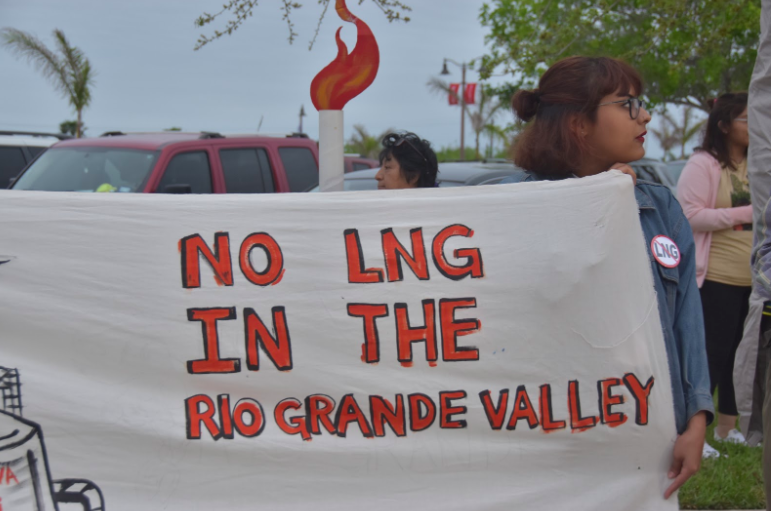
Today, while a global pandemic is infecting the globe, the Texas Commission on Environmental Quality (TCEQ) approved the hotly opposed air permit for the Annova LNG fracked gas terminal during an online commissioners meeting. Annova LNG is one of the three fracked gas export terminals proposed for the Rio Grande Valley near South Padre Island, TX, that would turn the pristine coastline into a maze of explosive pipelines and environmentally-destructive industrial landscape. Approval of the permit allows the project to release toxic emissions into the air that would be damaging to public health and exacerbating climate change.
Opposition against the air permit and the Annova LNG project has been on-going. The Rio Grande Valley communities of South Padre Island and Port Isabel have been pushing back to protect the health and safety of their residents by requesting a hearing from the TCEQ to contest the air permits for Annova LNG and the other two fracked gas projects. A year ago, more than 1,100 Texans submitted public comments demanding that the commission reject the Annova LNG air permit. This morning, the Commission denied all nine individuals or entities that had requested a contested case hearing, including Port Isabel and South Padre Island, claiming the individuals were either too far away from the project site or did not meet the requirements for being granted a contested case hearings to show they would be harmed more than the general public.
“We're disappointed that TCEQ has ignored serious concerns about the pollution this dirty, dangerous fracked gas facility would pump into the air we breathe,” said Bekah Hinojosa, Sierra Club’s Brownsville organizer. “Annova LNG still faces legal challenges at the federal level, and we are determined to ensure that it is never built."
The TCEQ’s approval of the permit does not give Annova LNG the authority to begin construction. Annova LNG is awaiting a decision from the Army Corps of Engineers and a final investment decision on the project.
The fight to stop three fracked gas exports in the Valley continues.
Stopping the permits is part of a community-led movement to prevent the construction of Annova LNG and the two other proposed projects: Rio Grande LNG, the associated Rio Bravo Pipeline, and Texas LNG. Local residents have made it abundantly and consistently clear that these export terminals are not welcome.
Just over a week ago, Sierra Club joined local RGV residents, activists, and the City of Port Isabel in filing a set of lawsuits that challenge the Army Corps of Engineers and the Federal Energy Regulatory Commission (FERC) authorizing the three highly polluting fracked gas terminals that would be built in the Valley.
Shrimpers and fishermen of the Rio Grande Valley teamed up with Sierra Club and Texas RioGrande Legal Aid (TRLA) to challenge the Army Corps of Engineers for issuing a permit to Rio Grande LNG and the Rio Bravo Pipeline, arguing that the Corps avoid or mitigate negative impacts to wetlands. These projects could severely damage the environment, which would negatively impact the shrimpers and fishermen’s livelihoods.
The Sierra Club, community groups Save RGV from LNG and Vecinos para el Bienestar de la Comunidad Costera (represented by TRLA), and the City of Port Isabel also filed two lawsuits challenging Federal Energy Regulatory Commission’s (FERC) approval of the Annova LNG and Texas LNG projects. FERC’s socioeconomic and environmental justice analyses were flawed, as were the commission’s overall determination that the polluting projects are in the public interest. The same groups have already filed suit challenging FERC’s approval of Rio Grande LNG and Rio Bravo Pipeline.
The construction of these destructive and polluting projects is also a violation of Indigenous rights. The three projects proposed would disrupt sacred indigenous sites and lands and has received major opposition from the Carrizo Comecrudo Tribe in South Texas. The Carrizo Comecrudo Tribe were never properly consulted about the construction of these projects by the LNG companies.
This collective struggle has even spanned three continents: our allies across the globe have joined us to help stop the international fracking cycle. Countries that would import fracked gas from the Rio Grande Valley contribute to the demand for fracking here in Texas, which would lead to more earthquakes in the Permian Basin, the potential for explosions or leaks from fracked gas pipelines, and toxic pollution-- and these impacts would disproportionately affect low-income Latinx communities in South Texas.
The Rio Grande Valley is not a sacrifice zone for fossil fuel development. TCEQ’s approval of Annova LNG’s permit request further proves that the Texas environmental agency does not actually prioritize the environment or Texans’ health. Rather, they continue to cater to the interests of the fossil fuel industry.